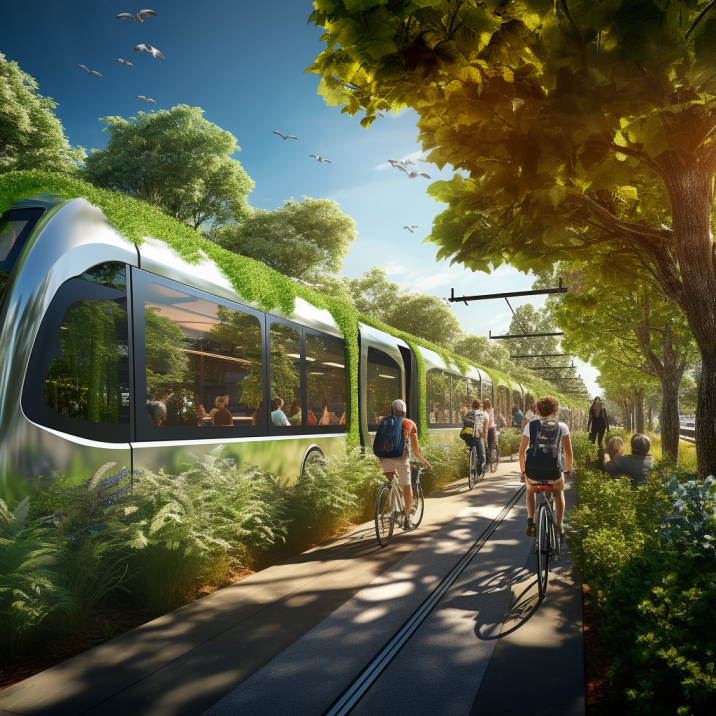A City Made for Moving
Imagine if you could leave your front door and be on your way to any suburb of your choosing within a matter of minutes. Imagine if a network of e-bike hubs connected all citizens to cheap, rentable transport that could be booked in a matter of seconds. Imagine if moving around Melbourne was fun, clean and simple.
By

An AI generated image of a tram covered in greenery with bikes and birds
It’s true that Melbourne enjoys a relatively robust transport network – but this network isn’t equitably distributed or effectively integrated. In fact, According to the City Portrait for Greater Melbourne, our Social Foundation is blighted by a Mobility problem.
Across our city, transport is expensive, dirty, carbon-intensive, inaccessible and untrustworthy. To move within the Safe and Just Space, we must address our mobility issues so that all citizens can easily, even joyfully, access the things they need – work, education, groceries, community – to thrive.
How does this help us move to the sweet spot? The Safe and Just Space?
Imagine you’re commuting to work. And instead of driving your fossil fuel-powered car, you had a choice: you could hire an e-bike with a few taps of your smartphone, or you could jump in the community carpool (electricity-powered, of course), or you could walk to the newly-built inner rail loop and hop on a solar-powered train to whisk you away. Perhaps you could even book a service like Uber – but you knew that the drivers took a fair amount of the money you paid them for their time.
Now imagine if one of those methods was for some reason out of action, and you still had a range of viable, cheap and clean energy-powered ways to get where you’re going. Sounds nice, doesn’t it?
Mobility for a city like Melbourne matters. And it has many other benefits to our Social Foundation and Ecological Ceiling besides getting us from point A to point B. For example, a 100% clean energy-powered transport network will go a long way to mitigating Greater Melbourne’s negative impact on the climate. Cleaner transport would drastically improve our air quality. Accessible and cheap public transport will mean more people can access a wider variety of options for work and education. It will make it easier for us to connect with our community, friends and family.
The issue of mobility is complex and there’s a foundational truth here that we need to recognise: our cities are currently designed for private vehicles, not for people. So solving the issues will require not just improving, expanding, democratising and electrifying current transport infrastructure, but also redesigning the very infrastructure of the city itself so that we are less reliant on powered transport in the first place.
What’s happening in Greater Melbourne?
Across Greater Melbourne, many innovative solutions are already being implemented. The Victorian government has a 2017-2050 plan to create 20-minute neighbourhoods in which citizens can meet most of their daily needs within a 20-minute return walk from home. The concept would reduce the need for cross-city travel while building tighter-knit communities and potentially revitalise our dwindling high streets.
Organisations like Lug+Carrie and Sparque are already offering subscription-based e-bike hire for individuals, families and professionals, enabling them to rent a form of clean transport to suit their personal needs – and give it back when they no longer need it. Kola goes one step further, and upcycles (pun intended) used bicycles to turn them into e-bikes, which can be bought or rented. The likes of Lime and Uber have also increased the presence of short-term e-bike and e-scooter rentals across the city (an imperfect system so far – but an innovation no less).
For the school run, Moonee Valley’s Walking School Bus program enables kids to join their peers on a chaperoned stroll to school – meaning parents don’t need to hop in the car for the short journey to the school gates, nor do they need to send their child off to walk to school unaccompanied (the program has the added benefit of helping the students get a good chunk of incidental exercise during the school run).
The Public Transport Users Association has been campaigning for more accessible and equitable transport in our city for over two decades. Among others, their lobbying wins include extending the Box Hill tramline to reach more citizens, increasing the frequency of weekend tram and train services, and allowing commuters to take their bikes on trains.
While Regen Melbourne’s work is focused on Greater Melbourne (and our impact both locally and globally), Colombian President Gustavo Petro perhaps said it best when he said: “A developed country is not a place where the poor have cars. It’s where the rich use public transportation.”
All that’s left is to make it happen.